63CD - Orchestra Of The Upper Atmosphere - θ3 - CD plus download
TweetListen

Martin Archer – keyboards, electronics, saxophones, clarinets, flute, bass recorder, bass harmonica
Chris Bywater – keyboards, electronics, laptop, percussion, voice
Steve Dinsdale – electronic drum kit, keyboards
frostlake – voice, electronics, viola
Yvonna Magda – violin, electronics
Walt Shaw – percussion, electronics, voice
Terry Todd – bass guitar
with
George Murray – trombone
Paul Schatzberger – violin
Aby Vulliamy – viola
Angela Rosenfeld – cello
Discus Music is proud to present Theta Three, the third release by the improvising rock group Orchestra Of The Upper Atmosphere, a 7 piece outfit referencing the music of Terry Riley, prog and Krautrock explorations with a contemporary electronic edge.
This third double CD showcases the core band at their best- innovative improvisation, haunting hypnotic grooves and blasts of sheer exuberance.It has been simmering since 2015, when bass and drums laid down inspiring rhythms and a day's recorded improvisations in the studio led to a collection of infinite complexity and powerful pieces.
This time round the band have been augmented by strings and trombone and is a project on a big scale with a more defined band feel.The 20 tracks are an enticing mixture of improvisations and composed pieces each complete in themselves but combining to make an astounding whole. Enjoy...
Had Pink Floyd's Ummagumma taken a jazzy detour, the results could resemble much of Theta Three....This collection of composed and improvised pieces is permeated with a spacey, psychedelic effervescence. Brooding bass-saturated landscapes, arcs of echoing electronics, thickets of ruminative horns, terse violin arrangements and chilly drifts of Mellotron create an immersive world that evokes the analogue spirit and tonalities of early minimalism and capacious mind-expanding playfulness of Kosmische Musik's pioneers. - Sid Smith, PROG
____________________
3rd album of innovative improvisation, haunting hypnotic grooves and blasts of sheer exuberance, with the band augmented by strings and trombone to give them a larger and more intense sound. – SQUIDCO
____________________
It’s a captivating group of musicians that combine trance-like electronic music, progressive rock, jazz-rock fusion and avant-garde classical music through improvisation. The new album is a two-disc set, Alpha (α) and Omega (Ω). The pieces flow seamlessly, crossing progressive music boundaries with total ease. - PROGRESSIVE ROCK CENTRAL
____________________
A sublime meeting of composed sections and improvisation, θ3 continues the progression of Orchestra Of The Upper Atmosphere apace, and showcases a group of musicians who, comfortable in their own skins, can anticipate their colleagues’ next moves with an élan that results in a highly enjoyable excursion to the outer limits and back again. A meeting of jazz rock, space rock, and experimentalism, this is an album that should find approval from fans of all those handy little cookie jars. – ROGER TRENWITH, THE PROGRESSIVE ASPECT Read full review here
____________________
Broadcasting from outer and inner space, OUA are an eight-piece group led by Martin Archer. Journeying through experimental krautrock, minimalist electronics, modern classical and transcendental jazz, the Sheffield group are also, it has to be said, unashamedly rooted in the triple gatefolded world of 1970s progressive rock.
Playing music built out of improvisation but nevertheless studiously structured, the territory here is one of recurring motifs, orchestral ambition and astronomical sonic palettes. Sun Ra, Akice Coltrane, David Axelrod, Philip Glass and Terry Riley all receive a nod in these opaque extended songforms, as do Xhol Caravan and Tangerine Dream, among any number of prog outfits ranging from the well known to the ludicrously obscure.
Whether it's the cosmic grooves of "An Excess Of Protons" and "Orionid", the flowing clarinets, rattles and bells of "Graced With Secrets", or the parping outer space disco of "Circularity", the Orchestra build their sound from the outside in. Jah Wobble basslines alternate with a repeated crescendo of violins on "Solar Prominences", before collapsing amid scattered percussion. Slowed down wave crashes emerge from phased reversed loops and ominous rumbles on "Fictitious Force" in a piece that threatens to break out but restrains itself to fluttering among beats and bleeping tones like a simple harmonic motion oscillation. There's plenty to keep the ears busy as the Orchestra pile up immersive layers, building the tension before it deliquesces into forms, frequently several times.
Squelching, bubbling sounds and half buried. whispered spoken word trip over and around a modular tone in "Anisotropic Shapes" while a synth symphony builds, falls back and builds again into a motorik ritual waltz, trombone floating over the top. If that isn't enough, there's the pitchbent guitars and knob-twiddling synths of "Accelerating Expansion" which blend, snarl and twitch, straining against prickling drums in a cosmic rock that, seeminglu having failed to find a way to conclude, unexpectedly fades out fast.
More meditatively, there's the blissed-out pastoral of "The Dust Of Blue Fire" and its laidback stretching out of lines, and the minimalist shmanistic electronics of "Inertial Force". Although capes and wizard hats would no doubt be welcome at any of their live shows, for the most part Theta Three finds Archer and company trading in atmospherics without bombast. - KATRINA DIXON - THE WIRE
____________________
The third release from Orchestra Of The Upper Atmosphere is simply called 03, and comprises a generous twenty tracks spread across a double CD set. In every way this lives up to the precedents set by their previous releases, and I have to say I find this Orchestra one of Archer’s more successful operations, unfailingly producing joyous and exciting, innovative music. What the Orchestra produces is a mix of jazz, electronics, atmospheric drones, and experimental rock; all the music is created through a combination of methods and techniques, including improvisation, composition, scored arrangements, and studio post-production and editing; one senses a holistic approach to making music, a start-to-finish process where no detail is left unattended. You can tell Archer is proud of all this, and I expect the players are too; no wonder he feels compelled to publish so much of the material, but even at this gargantuan length there is no sense of excess or “sprawl” which the CD format so often allows.
If I’m reading the press notes correctly, these pieces began life as rhythm tracks: drum and bass parts recorded first, on top of which were dubbed a day’s worth of studio improvisations from the players. A credible working method, one I think which has been common in pop and rock records since the 1980s – Peter Gabriel was just one proponent of this “patchwork” method, I believe. This particular collection of the Orchestra has been “cooking” in the studio since 2015, an index of the meticulous care Archer puts into these projects.
The Orchestra create such a grandiose sound that I’m always surprised when I read the personnel roster and find there are only seven players credited – although admittedly there are found guest players listed too. This is a commonplace remark for me, but the big sound of this record easily matches records made by forbears such as the Arkestra, Gil Evans, or Keith Tippett’s Centipede.
One thing I’m noticing on today’s spin is that there aren’t really any clearly defined “solo” spots for any of these talented musicians, one area in which Archer’s ideas build on the conventions of jazz and advance the music. The idea seems to be to create a homogeneous blend of sounds and continuous stream of beautifulness, yet the instruments are still identifiable and clear. To a large extent the notion of working to scored charts and arrangements also seems to have been relaxed, in favour of allowing the music to emerge organically (sorry, there’s no other way of saying it) as a force on its own terms. But I’ll stop now before we start trotting out the usual Teo Macero and Electric Miles comparisons. - ED PINSENT, SOUND PROJECTOR
____________________
Aller guten Dinge sind ja bekanntlich Drei. Und so legt das Orchestra of the Upper Atmosphäre dieser Tage folgerichtig sein drittes Album vor, welches dem Schema des Vorgängers folgend (siehe "Θ2") den Titel "Θ3" trägt (ausgesprochen "Theta Three"). Wieder handelt es sich um ein sehr gut gefülltes Doppelalbum, welches im inzwischen für das Label (Discus Music) typischen platzsparenden aber eleganten Pappklappschuber steckt.
Das Orchestra ist hier in seiner leicht reduzierten Kernbesetzung zu hören (die wohl auch meist bei Konzerten zu Gange ist), ergänzt um das La Garotte Streichquartett und George Murray an der Posaune. Der Anti-Chor Juxtavoices und die Devine Winds (auf dem Erstling noch als Bläserquartett tätig) sind diesmal nicht mit von der Partie. Dementsprechend kommt die Musik auf "Θ3" etwas elektronischer, oder elektrifizierter, und auch deutlicher in Rockgefilden verwurzelt aus den Boxen.
Am musikalischen Grundkonzept der Formation hat sich indes nicht viel verändert. Virtuos und kreativ sind Martin Archer und seine Mitstreiter am musizieren, an mit Testen oder Reglern versehenen Klangerzeugern meist, ergänzt um allerlei Balsinstrumente, Streicher, Stimmeinlagen und Perkussives, oft über eine dynamischen Grundlage aus Bass- und Schlagzeugmustern. Stilistisch bewegen sich die so erzeugten Tongebilde, Klanggemälde und Soundgewebe irgendwo im Grenzgebiet von Jazzrock, Krautrock, Elektronischem, Retroprog, Postrock, Kammerrock, Avantprog und freiem Klangexkursen, oder spielen mit in diesen mehr oder weniger gut definierten Stilschubladen unterbringbaren Konstrukten, erzeugen dabei aber eine ganz eigene, dicht und komplex verwobene Klangwelt. Mal krautig-sperrig, mal kosmisch-wabernd, mal spacig-treibend, mal hypnotisch-minimalistisch, mal elegisch-klangmalend, mal jazzig-rockend, mal schräg-freiformatig gleitet die Musik vorn, sehr farbig, vielschichtig und voluminös.
Etwas erdiger und direkter ist man im Vergleich zu den Vorgängeralben zu Gange, groovt die Musik bisweilen doch erstaunlich direkt und schwungvoll, minimalistisch-treibend und sehr intensiv (man höre z.B. "Solar Prominences", "Circularity" oder "The White Dog", die zudem ausgesprochen gelungen Elektronisch-Pulsierendes mit Akustischem, Streicher in "Solar Prominences" und "Circularity", Posaune in "The White Dog", und kernigen Bassläufen kombinieren - was auch sonst nicht selten auf diesem Album geschieht).
Ein freier geformter ausladender, intensiver krautig-kosmischer Jazzrock gleitet hier meist durch die Gehörgänge, an den Früh-70er-Elektrojazz eines Miles Davis (ohne Trompete und mit mehr Elektro) gemahnend, versehen mit repetitiven Tastenmuster à la Terry Riley, Canterbury-artigen Einlagen (waberndes Orgeln und perlendes E-Pianoklimpern), hallend-sonoren Saxophonexkursen, spacigem Synthesizerfiepen, -zischen und blubbern, mysteriös-flüsternde Gesangseinlagen (von frostlake), symphonischen Streicherschüben, kernigen Pianomustern und dynamischen Tastenwogen. Das klangliche Ergebnis arbeitet sich dabei durchaus rund und packend durch die Gehirnwindungen, ohne allzu kantig oder gar wüst ausgefallen zu sein. Easy-Listening ist das aber natürlich trotzdem nicht.
Wie beiden den beiden Vorgängeralben würde es sicher den Rahmen einer Rezension sprengen auf weitere Details einzugehen. Es tut sich sehr viel auf diesem Album, das fast das vielseitigste und abwechslungsreichste der Trilogie ist. "Θ3" ist auf jeden Fall eine sehr starke und beeindruckende Fortsetzung des OUA-Katalogs, welche jedem Freund progressiver Gratwanderungen zwischen Elektronik, Jazzrock und Avantgardistischem sehr empfohlen sei. Und, ich denke aller guten Dinge sind mindestens vier. Ich freue mich schon! - ACHIM BREILING, BABYBLAUE SEITEN
____________________
I have been mightily impressed by Martin Archer’s musical excursions recently and Orchestra Of The Upper Atmosphere Theta Three is no exception with three splendid ambient pieces with efficacious use of synth, occasional sax and underpinning bass riffs by Terry Todd combining with the electronics to create a real hypnotic groove at times. Fictitious Force breaks the spell somewhat, an experimental electronic piece with whispered voice until percussionist Walt Shaw returns to accompany distant organ chords and synthesizer swooshes as protons are imitated in sound with Arabic sounding and an insistent string synth line, shimmering electric piano and echoing sax near the end. After a long atmospheric track representing Anisotropic Shapes there are three further pieces in the 6 – 8 minute mark, one depicting Coriolis Force and another Synaptic with the voice of frostlake and violin. Pororoca with organ and brass and the return of the drums is a return to jazz and quite a filmic piece with a Moog solo, a fine way to end CD 1. And so to CD 2, where a small string section appears with a trombone player, a slow burner of a number with what sounds like fairly demented steel drums briefly before a trombone solo takes hold. It reminded me in a strange way of Alice Coltrane and I can’t think why. Galleon has a familiar Inception like melody while Tangential Force is the equivalent to the 10 minute Anisotropic track on CD 1, but eerie ending with the feeling of being in empty outer space. The White Dog is by turns jazzy and Krautrock inflected, almost motorik in its repetitiveness. Spark Erosion has a nice relaxed bass line, synth and organ. The group get a little bit funky on Accelerating Expansion with a fluid Mike Ratledge style organ solo and punchy brass backing. If this were on vinyl it would take four LPs to contain it, giving you an idea of the range and scope of this “alpha to omega” project. It is difficult to make comparisons but Terry Riley, Sun Ra, Soft Machine, early Pink Floyd and early Tangerine Dream give some idea. – Phil Jackson, ACID DRAGON
____________________
Another double album. This is the third opus of this largely rock-inspired group, in which Martin Archer, Chris Bywater, Steve Dinsdale, Frostlake, Yvonna Magda, Walt Shaw and Terry Todd officiate. With the exception of the latter (on bass guitar here), each of these musicians make use of electronics as well as their own traditional instruments (keyboards, horns, drums, Frostlake vocals, violin, percussion) on the album. The group presents music of different climates (the keyboards are a strong presence in this), with pronouced influences: Terry Riley, 'progressive' groups and German Krautrock. To return to the idea of climates, these change according to the instrumentation brought to the forefront in each piece. The group is also joined by a trombone and a string trio, which provide further possibilities in the variety of themes. The heart of this music lies in the core of the metronomical bass/drums axis, which sets up the explorations of the soloists (Yvonna Magda's violin playing is particularly at ease herein). - IMPROJAZZ
____________________
Mamutí extravagancí jsem nazval předchozí 02 a co do rozsahu si s ním nezadá ani 03. Orchestra Of The Upper Atmosphere, vyhýčkané dítko Martina Archera, skladatele, elektronika, klávesisty, saxofonisty, klarinetisty, flétnisty atakdále, je tu prezentováno na dvou discích skutečně od alfy až po omegu (jak čteme v jejich záhlavích) a v obdobném obsazení včetně čtyř hostů – trombonisty Georga Murraye, houslisty Paula Schatzbergera, violistky Aby Vulliamy a violoncellistky Angely Rosenfeld. A přece tu neběží o totožnou záležitost. Těch dvacet komprovizací, při jejichž poslechu nerozpoznáme, co je složeno a co improvizováno, tak kompaktní se jeví, oplývá na rozdíl od minulého opusu záviděníhodnou jednolitostí, namíchanou ovšem z nejrůznějších ingrediencí. V těch se navýsost činí klávesista Chris Bywater, bubeník Steve Dinsdale a perkusista Walt Shaw, houslistka Yvonne Magda, baskytarista Terry Todd a violistka a poloutajená vokalistka frostlake, všichni ve značné závislosti na elektronice. Vše bylo natočeno ve čtyřech různých místech v letech 2015 až 2017, což svědčí o opětovném alchymizování výsledného znění. Sám Archer uvádí, že mu šlo o inovativní rockovou směs, křtěnou Terrym Rileyem, progrockem, krautrockem a elektronickým vyostřováním. Ale to nepovažuju příliš za podstatné, protože celek se jakékoli klasifikaci vzpírá.
Hned úvodní Orionid se z „odkudsi“ vyhloubává, prosyčuje, proskřipcovává, jde o proklikatěné dumání s pádným rytmem, přecházející do sjíždivých cvalů a obepnuté vznosnou harampádností. Je rozbohacován do stále převalivší údernosti, zavalivé a rozbušné. Jednotlivé nástroje nevzdorně opojivý běh částečně prosólují, což elektronika pozahaluje a záměnlivě prošumuje, nicméně náhončivě usebrané prořetězení vždy znovu nabírá sílu, nikdo tu neokolkuje, naopak se všichni ujednotí v zářezném repetování. Z proznívavého, odklepně vyvstalého čiřikání se Solar Prominences pak promlacují do proskučnosti i prozvonivosti, ale – a to je pozoruhodné – vyvstalá řádivá probušnost je napodiv srovnaně neexcentrická, ba dokonce spořádaně nalinýrovaná; i když se rozpíná a vyvolňuje a niterně hutní, její prolamování, propraskávání a záskučnění, byť poněkud huntující, není rabijátské. Podobně je tomu ve vyjíždivě odrochávaném Graced With Secrets, vyhořkle protajemňovaném, tu zapřímočařeném, tu odlamovaně spádném. Je rejdivě (ú)nosné, útěšlivě nomádní, plné pučící vrzukavosti, štandopédně poddusávané. Zvukolíčivě pranýřující je naopak Fictitious Force, sběrně podmru/ačivá, brodivě vytěsněná do temperující zámrskovosti, ždibkovaně průvlačné a špetkově rozkurážované do zapadavě škvířeného prošeptávání. Se sebejistou odvahou se rozvrtoší An Excess Of Protons, zrůzňované vstupy nástrojů (jejich náhlostní prostřídávání neumožňuje je vyjmenovávat) nad bortivými perkusemi se prokříží se stáložárnou proudností, takže vrtošivá zpupnost oxiduje v zezávažňující orchestrální monolitnost. Ani ta se však nezavíjí do sebe: zastřešivě vyvěrá do výkvilného ptáčnění. A je to podobně vydedukované štěbetavé obhlédání, které se srotí v Anisotropic Shapes, kroutivě se prolonguje do vyšeptávané roztřesnosti či výtřesnosti, je odpalestrováno do bloumavého šumlení, třísnivého prokružování i bácivého rozpotácnění se šňořivými prozvučkami a zabořivými předhůzkami. Šrotivostně rozpotácivé chórování se v pravý čas proboří do odbouřněného zabourávání. Vyvodivě uvozená a zeštymovaně zesilovaná Circularity se pak zatumluje do rejdivě vypráskaného proskrumážení, zhoufovaně cirkulujícího a protažného, až samohybného. Coriolic Force naproti tomu mátožně vyvěrá z vydyndávaného šátrání, osciluje mezi pidizvuky a monstrózujícím podvlakem, ale jako obvykle se potichlení rozvíří do hemživého rochnění a rojivého vzáběhování, nadnášivostně výběživostního a zrušněně zamíchávaného. Zvrat: tenisující proskočnost Synaptic oplývá jak záškubní zápasivostí, tak hymnující propastností, je troufale neslitovná i obžalobně žalná (hlas!), jednosměrně vláčivá, výdržně přípojná i zádlužně pošeptná. Což je v protikladu k záškubně provalivé Pororoca, výtlučně prohrncované a výpalně útočné. Její zešikovávaná zádernost je průsečně prodrcovaná, překotně překotivá, prostopášně jurodivá a briskně štířivá. Když se pak přehoupne do výkružně tanečního víru, zakcentuje pulzující střečkování a skončí v odletnosti.
Druhý disk otevírá The Price Of Revealing se zapikolovávaně vzlínajícími vzmachy, prosakujícími do stupňovitě rozkeřené burácivosti, zároveň vyzývavé i souměrné, vybičovávané i zaostávající. Nadmýchávaná roztřepivost zmohutní do neuhýbavé velebivosti, hybatelsky valivé a kposledu mizející. Bubnivou nástražností oponuje Galleon až svatořečné chorálovosti, výpravně dosložiťované překryvným nalaďováním dolaďováním do kypivé zahrávavosti. Tušivá i tušově podmítavá je Tangential Force, zádrhelně vyvěrající i vyhmatávaná do stočné šumivosti. Její odkládavá hladkost je s probíjivým podštěrkováním vrzukavého štětění střídavě poodkrývána a pozakrývána do výlevného po(d)šeptávání, záhybně zatajemňována do násobivé potichlosti. Nestřídmě a natážlivě vrutivé vrtulnění charakterizuje The White Dog Is Your Father, zakotoulované do výzevně hatmatilkové rušnosti, dobývačně nákřičné, zamláčeně svistné a vrtichvostně vymýtavé. Muzikanti své party rozehrávají až na pomezí manifestační táborovosti, od nadsazované smečnosti vžejbrují do vabankové propastnosti, jejich násilnická pokřikovost se dobírá k dosilované úlitbě. Podhoubně protkávaný je i Niobium, vybluzovaně vycinkávaný, výpustně vykružovaný a zarážlivě srážlivý. Jeho podmiňovaně oznamivá roztoulávanost je značkována okapnými zvraty, pestřením i záhromněním, zabíhá do ostýchavé hladivosti perletnění. Ostražně, poskočně i záskočně vkypí Spark Erosion, vytěkává do nahmatávavého erodování, tázavostně se rozligotá, aby je trumfnul triumfující bušivostí a posléze se odbouřnil do přeludně proznívavé zahalivosti. S podobnou záludností vmihotá do děje The Dust Of Blue Fire, nasměrováván zpochybňujícími bicími, postupně se však skutečně rozohní do výlučné blouznivosti, proklouzávaně poladné i zrůzňovaně výstřebné nabídnutými „zprávami“. Jeho zárudná vřešťanovost je dopována harašivostí bicích. Duelově poskočné i akcelerovaně rozvíjivé a odvíjivě zmnožované je Accelerating Expansion (ten titul říká vše!), je nevratně i nezvratně zhybňované a pro(b)loudivě machrované, usilovně zvibrovávané a násilnicky vybuzované. Jeho roztempovanost je rozparáděně hatmatilková a krouživě rozhorlovaná. Čekáte-li kýženou razantnější proměnu, splní ji Inertial Force, znahodiněle odmotávaná a vymátořovaně vymotávaná do výčnělkové rozštěpnosti, teteřivá do nejmenších titěrností, rozšlapně pozotvíraná. Je totiž pábivě odšlojířovaná, podbíravě vibrující, pošeptně zapošívaná i zabloudivě porozdíravá. A skutečně: jako by se soubor až v závěrečných fázích vyvázal z určité, byť bohatě namachrované „machy“, odvazuje se i závěrečné Circumzenithal k rozmotávání těch nejmatovějších sfér říše ticha, niterných a většinou zapoutaných do neodkryvné složitosti. Jenže to by zřejmě nebylo to správné zakončení, a tak soubor zceliství svoji spádně zrytmizovanou a vokálně podstíněnou harmoničnost a vyvrcholí s bezobavnou výbojností, halasnou pádností, rozmáchlou proudivostí a „výřečně“ rozcapenou příkrostí celé dvojalbum.
Martin Archer opět dokázal absolutní suverenitu ve vedení hudebního tělesa od výběru hráčů, předestření obsahu a zaměření i konečného dopracování výsledného znění. Tentokrát je tu vše nadupané, ale konec konců nikoli nemírumilovné, neboť výboje probíhají v mezích nenarušivosti melodické i rytmické. Hráči nemusejí/nesmějí experimentovat, neboť sebejistým experimentem se má jevit celek. Perfektní souhra mezi komponováním a improvizováním je dovedena až do absurdní jednoty, přičemž mi připadá, že závaží přesahuje do většího kalibru předpřipravenosti. Proto je vše výsostně násměrné a nevybočivé. Každý z hudebníků zřejmě ví (nebo si alespoň uvědomuje), kdy a kam má zaskočit s drobným zázvukem, kdy má v neustálé protiřečnosti uplatnit záchmurnost, štětění, vrzukavé žaluznění, cokoliv, co je nasnadě. Přitom ustavičná skrumážovost všech nástrojů v rytmizované posouvavosti dovádí všechny k velkokapelové svornosti. Výhrada? Ano, občas se ptáme, není-li té usebrané sehranosti, (možná až příliš) perfektní, už tak trochu moc, až se z té přemíry dokonalosti zalykáme. Té zásadní odlišnosti (dílčí odlišnosti jsem se pokusil převést z hudebního vyjádření do slova psaného, viz výše) tu přece jenom není tolik, že si občas říkáme, že by přece jenom někdy neuškodil nečekaný vývrat, zásadnější vybočení. Což nejsou ani tak výhrady jako přemítání, co by měla eventuálně posílit nebo rozhojnit nebo naopak umírnit čtvrtá šance Orchestra Of The Upper Atmosphere. Jinak se hodnocení pohybuje ve známkách nejkladnějších. - ZDENEK SLABY, HISVOICE





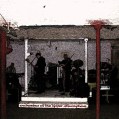 40CD - Orchestra of the Upper Atmosphere - Theta One - CD plus download
40CD - Orchestra of the Upper Atmosphere - Theta One - CD plus download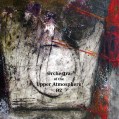 47CD - Orchestra of the Upper Atmosphere - θ2 - CD plus download
47CD - Orchestra of the Upper Atmosphere - θ2 - CD plus download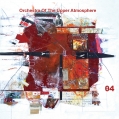 70CD - Orchestra Of The Upper Atmosphere - Θ4 - CD plus download
70CD - Orchestra Of The Upper Atmosphere - Θ4 - CD plus download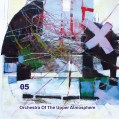 101CD - Orchestra Of The Upper Atmosphere - Theta Five - CD plus download
101CD - Orchestra Of The Upper Atmosphere - Theta Five - CD plus download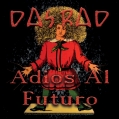 94CD - Das Rad - Adios Al Futuro - CD plus download
94CD - Das Rad - Adios Al Futuro - CD plus download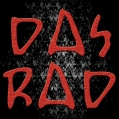 75CD - Das Rad - Das Rad - CD plus download
75CD - Das Rad - Das Rad - CD plus download